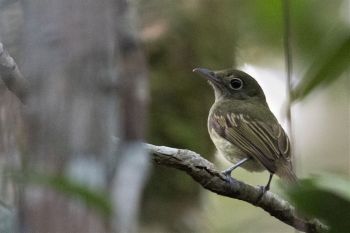- Rhynchocyclus olivaceus
Identification
15 cm
- Dark olive head and upperparts
- Bright green back
- Breast area with more or less prominent grey streaks on yellowish background
- Belly and lower underparts yellowish
- Light green to yellowish-edged primaries which are fairly prominent
- Large dark eye
- Whitish or grey eye-ring
Similar species
Very similar to Eye-ringed Flatbill (which see). Note the wing feather edgings to distinguish the two.
Distribution
Central and South America
Central America: occurs only in Panama
South America: Colombia, Venezuela, Guyana, Suriname, French Guiana, Ecuador, Peru, Bolivia and Brazil
Taxonomy
Subspecies
There are 9 subspecies[1]:
- R. o. bardus: Eastern Panama and north-western Colombia (northern Chocó to southern Bolívar)
- R. o. mirus: North-western Colombia (lower Atrato Valley and inland from coast)
- R. o. flavus: Northern and central Colombia and northern Venezuela
- R. o. jelambianus: North-eastern Venezuela (Sucre and northern Monagas)
- R. o. tamborensis: Central Colombia (Rio Lebrija region of Santander)
- R. o. aequinoctialis: South-central and south-eastern Colombia to eastern Ecuador, eastern Peru and north-central Bolivia
- R. o. guianensis: Southern Venezuela, the Guianas and northern Amazonian Brazil
- R. o. sordidus: Brazil south of the Amazon (Rio Tapajós to northern Maranhão)
- R. o. olivaceus: North-central and eastern Brazil (eastern Pará; Pernambuco to Rio de Janeiro)
Habitat
Lower levels of humid lowland forests, thickets and swamps.
Behaviour
Diet
Their main diet consists of arthropods. They generally forage alone.
References
- Clements, J. F., T. S. Schulenberg, M. J. Iliff, S. M. Billerman, T. A. Fredericks, B. L. Sullivan, and C. L. Wood. 2019. The eBird/Clements Checklist of Birds of the World: v2019. Downloaded from http://www.birds.cornell.edu/clementschecklist/download/
- Lepage D. (2021) [Avibase - https://avibase.ca/DF0D4F47 ]. Retrieved 22 July 2021
- del Hoyo, J., J. Bates, G. M. Kirwan, and N. Collar (2020). Olivaceous Flatbill (Rhynchocyclus olivaceus), version 1.0. In Birds of the World (S. M. Billerman, B. K. Keeney, P. G. Rodewald, and T. S. Schulenberg, Editors). Cornell Lab of Ornithology, Ithaca, NY, USA. https://doi.org/10.2173/bow.olifla1.01
- BF Member observations
Recommended Citation
- BirdForum Opus contributors. (2024) Olivaceous Flatbill. In: BirdForum, the forum for wild birds and birding. Retrieved 16 April 2024 from https://www.birdforum.net/opus/Olivaceous_Flatbill
External Links
GSearch checked for 2020 platform.





